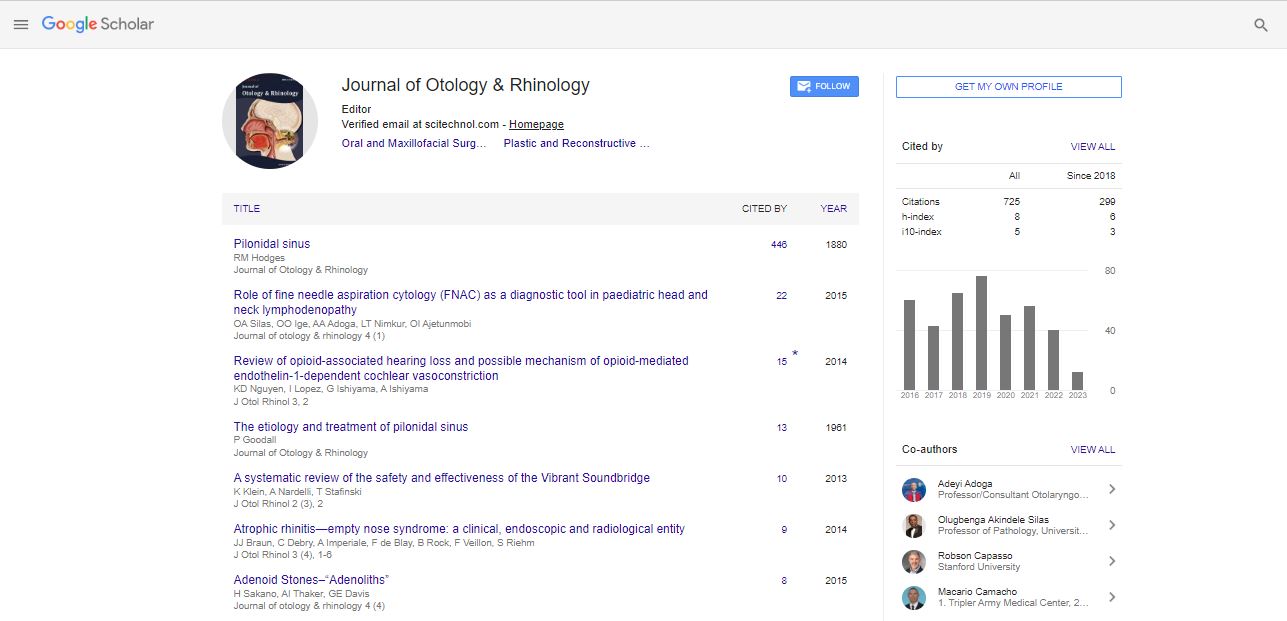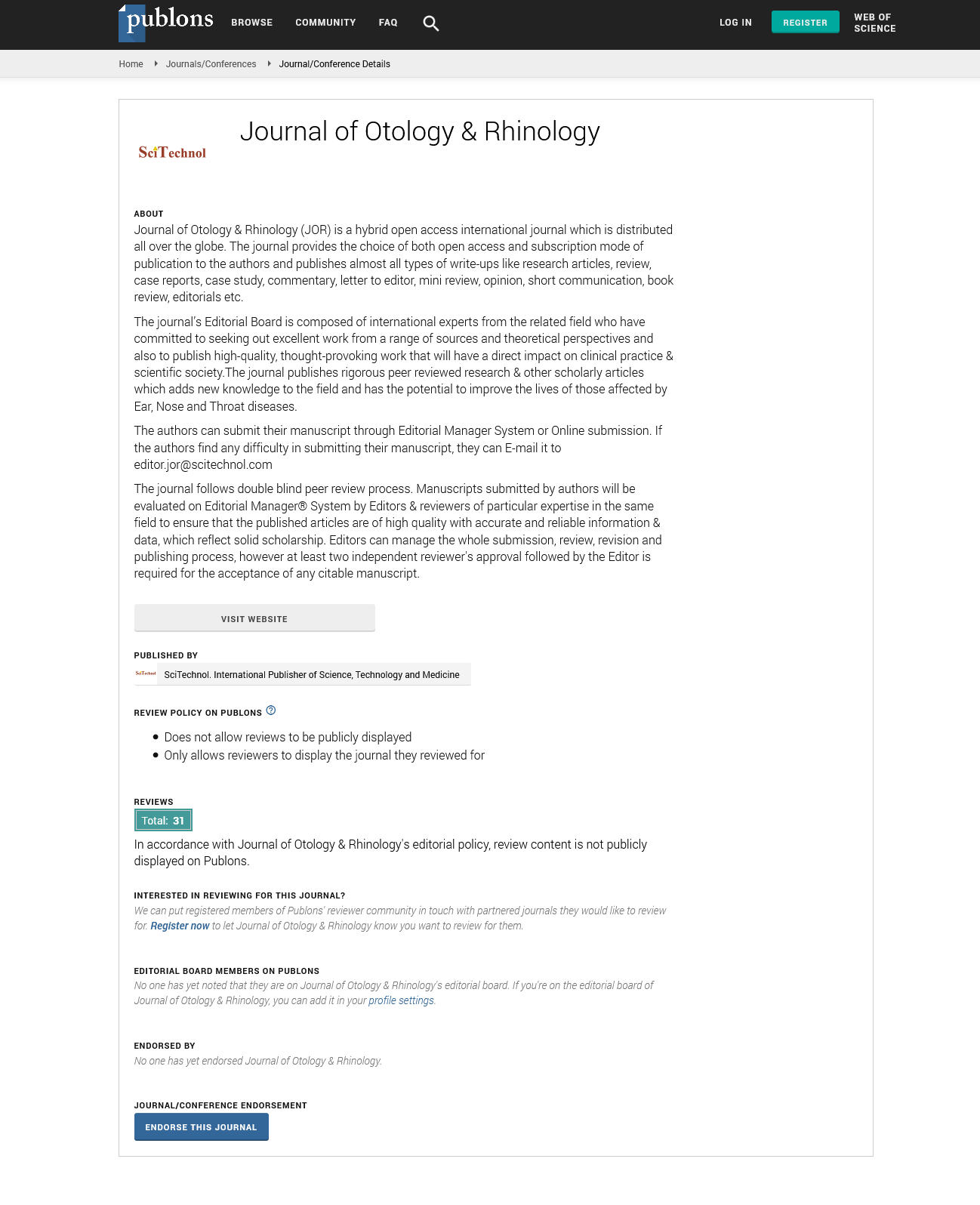Opinion Article, J Otol Rhinol Vol: 12 Issue: 3
Parosmia and its Psychological Implications
Carlos Haseli*
1Department of Surgery, Albany Medical Center, Albany, USA
*Corresponding Author: Carlos Haseli,
Department of Surgery, Albany Medical
Center, Albany, USA
E-mail: haselicarlos@gmail.com
Received date: 21 April, 2023, Manuscript No. JOR-23-102348;
Editor assigned date: 24 April, 2023, PreQC No. JOR-23-102348 (PQ);
Reviewed date: 08 May, 2023, QC No. JOR-23-102348;
Revised date: 15 May, 2023, Manuscript No. JOR-23-102348 (R);
Published date: 22 May, 2023, DOI: 10.4172/2324-8785.100059
Citation: Haseli C (2023) Parosmia and its Psychological Implications. J Otol Rhinol 12:3.
Description
Parosmia is a condition characterized by a distorted sense of smell, where people perceive odors differently than they actually are. It is often associated with a loss of smell, known as anosmia, but can also occur alongside a partially diminished sense of smell, known as hyposmia. In parosmia, the sense of smell becomes altered, and everyday scents that were once familiar and pleasant can become distorted and unpleasant.
The exact cause of parosmia is not fully understood, but it is believed to be a result of damage to the olfactory system. This damage can occur due to various factors, including viral infections, head injuries, sinus problems, exposure to certain chemicals, or as a side effect of certain medications. Parosmia can be temporary or longlasting, and the severity of the condition can vary from person to person.
One of the most common manifestations of parosmia is cacosmia, where pleasant smells are perceived as foul and repulsive. For example, a person with parosmia may find the aroma of coffee or flowers to be nauseating instead of enjoyable. Similarly, food that was once appetizing can become unappealing or even intolerable. This can have a significant impact on a person's quality of life, as it may affect their appetite and ability to enjoy social gatherings involving food.
Parosmia can also lead to a distorted perception of non-offensive odors. For instance, a person may detect a burning or chemical smell in the absence of any actual source of such odors. This can be distressing and anxiety-inducing, as the person may constantly be on alert for potential hazards or dangers that don't exist.
Living with parosmia can be challenging and frustrating. It can affect a person's ability to enjoy food, diminish their appetite, and lead to weight loss or nutritional deficiencies if left unaddressed. The condition can also impact social interactions, as people with parosmia may feel self-conscious or embarrassed about their distorted sense of smell.
Treatment options for parosmia are limited, and there is no universally effective remedy. In some cases, treating the underlying cause of olfactory dysfunction, such as sinusitis or nasal polyps, may alleviate parosmia. However, for many individuals, the condition persists even after addressing underlying issues. Some people find that their sense of smell gradually returns to normal over time, while others may experience long-term or permanent parosmia.
Coping strategies can be helpful for managing the challenges associated with parosmia. These include experimenting with different foods and flavors to find those that are still enjoyable, focusing on the texture and appearance of food instead of relying solely on smell, and seeking support from healthcare professionals and support groups to share experiences and learn from others.
Research into parosmia is ongoing, and scientists are working to better understand the underlying mechanisms and develop more effective treatments. Some studies have explored the use of smell training, where individuals expose themselves to various scents to retrain their olfactory system. While this approach may not work for everyone, it has shown promise in some cases.
Parosmia is a condition characterized by a distorted sense of smell, where pleasant odors can become unpleasant or offensive. It can significantly impact a person's quality of life, affecting their enjoyment of food and social interactions. Although treatment options are limited, individuals can employ coping strategies to manage the condition and seek support from healthcare professionals. Ongoing research offers hope for improved understanding and potential interventions for those affected by parosmia.
 Spanish
Spanish  Chinese
Chinese  Russian
Russian  German
German  French
French  Japanese
Japanese  Portuguese
Portuguese  Hindi
Hindi 


